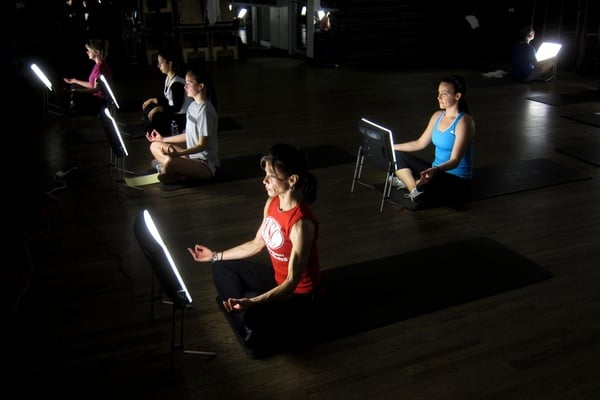The Washington Sports Club’s “Light Up” series will run for five more weeks. Photograph by Nick Wass.
On the day Washington Sports Clubs in North Bethesda launched its new “Lighten Up” class series, the Washington sun rose at 7:24 AM and set at 5:14 PM. Chilled daylight hung over the city for less than ten hours, and most of us spent the duration of that time in our offices, schools, and homes.
“This time of year, two things happen,” says Dr. Martica Heaner, who created the class for Town Sports International, the company that owns Washington Sports Clubs and its counterparts in other cities. “The new year brings new beginnings, and everyone aspires to have a fresh start and improve their lifestyle. At the same time, environmental factors like short, dark, cold days [. . .] keep us from going outside and often squash our desire to exercise.”
Season Affective Disorder, sometimes called the winter blues, affects about 14 million people in the US. Since SAD often leads to a lack of motivation, Heaner thinks it may be why so many New Year’s resolutions flop.
In an effort to combat this mood-dampening season, Heaner created the “Lighten Up” class, which launched this week in Sports Club outposts between Boston and Bethesda. The one-hour program consists of four parts and will be led by instructor Libby Linden Rubin for six weeks.
Part One: 5- to 8-minute warmup.
Part Two: 25 to 30 minutes of cardio and strength training in two-minute alternating intervals. On Thursday, this meant jumping, marching, jogging, squatting, wiggling our hips, and swinging our arms at various speeds. The group got through this set with tunes ranging from Katy Perry and Coldplay to Michael Jackson and Katrina and the Waves. Despite some rhythm and coordination missteps throughout the room (especially in my own space), the group seemed genuinely entertained—not to mention tired from the exercise.
Part Three: 5 minutes of simple dance steps and a cool-down.
Part Four: 20 minutes of stretching and light therapy, the kicker at the end of the class that left participants simultaneously relaxed and energized.
So what about this particular series of activities helps with SAD? “Intense cardio bumps up the heart rate, causing high doses of neurotransmitters like dopamine and epinephrine to be sent to the brain,” says Heaner. The cardio is followed by stretches, which ease physical tension and help release internal tension. Finally, the class ends with direct exposure to filtered UV lights at 10,000 lux, a treatment thought to reset our circadian rhythms, which control our internal clock and many of our hormones and can be sent into a tailspin during winter’s shortened days.
Though class participants were divided on whether they suffered from SAD, when asked if they felt happier upon leaving than when they arrived, the verdict was a unanimous yes.
Dan Fiorino of North Bethesda put it this way: “When you get into December and January, the days are short and everyone feels sluggish. But this was great—and it’s cheaper than a trip to Jamaica.”
The Washington Sports Club in North Bethesda (10400 Old Georgetown Rd., Bethesda) will host five more free SAD classes, open to the public, every Thursday from 11:30 AM to 12:30 PM. Each class seats ten and is on a first-come, first-served basis. Sign up at the gym’s front desk, or call 301-896-0505 for more information.


















